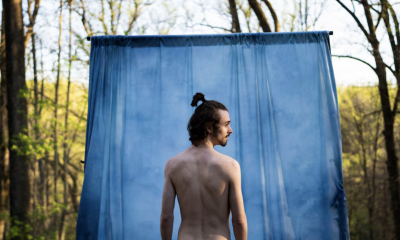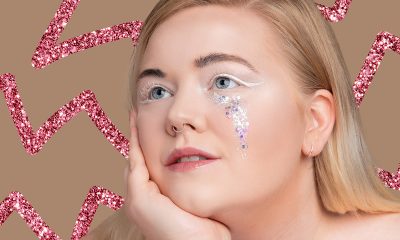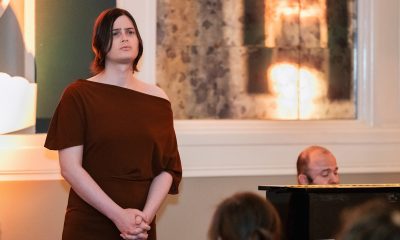Arts & Entertainment
Opera siren
Lesbian soprano Patricia Racette on ‘Tosca,’ being out and her life off the stage
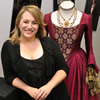
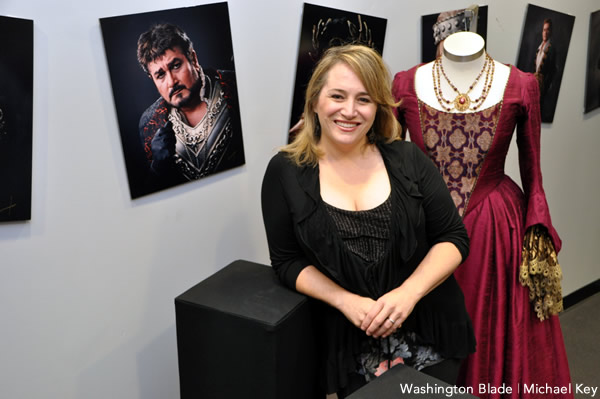
‘Tosca’ lead Patricia Racette at Washington National Opera’s rehearsal space in a Takoma Park warehouse. (Washington Blade photo by Michael Key)
Hardcore opera fans may quibble at the repetition, but hang around D.C. long enough and there’s a chance to see just about any standard-canon opera you can think of. Washington National Opera, now not-so-strange bedfellows with the Kennedy Center, kicked off its fall season last weekend with the Puccini warhorse “Tosca” with lesbian Patricia Racette in the title role.
Racette, who lives with her partner (mezzo soprano Beth Clayton) in Santa Fe, is hunkered down for the day at the Opera’s mammoth rehearsal/storage space in Takoma Park a few Mondays ago. Though dressed casually, she’s made up and coiffed as some of her afternoon press rounds are on camera.
Down several long hallways and through a giant costume room that looks like it could dress the entire cast of “Ben-Hur” and then some, Racette settles into a small and dingy library where CDs, VHS tapes and songbooks line the walls. During a 45-minute conversation, she riffs on her life off stage, the logistics of making it through live performance and why the stage, as opposed to the studio, is where she feels most alive musically.
Together for more than a decade and married since 2005, Racette says she and Clayton find a way to make their marriage work despite two busy careers that by necessity involve significant travel. Once several years ago they didn’t see each other for almost seven weeks.
“It was absolute torture,” Racette says. “Torture.”
Racette is developing a following in Washington. She was here in May for “Iphigenie en Tauride” (Gluck) after previous appearances in 2007 for “Jenufa” and 2009 as Ellen in “Peter Grimes,” all with WNO.
Though it half-heartedly reviewed the production, the Post called Racette’s “Tosca” performance “luminous” and “compelling” and praised her stamina and vocal authority in “Iphigenie.”
Racette calls singing opera akin to surfing.
“I mean it’s a fine art and it’s called a fine art for a very, very good reason because it takes a lot of study, a lot of concentration, a lot of precision and it’s ongoing. As long as you’re a singer, you’re tidying up and you’re working on these things. I don’t worry if I’m gonna hit the note, that’s not my thing. But you have to have everything in line and as fluid as possible because it’s true, once you get there, you’ve got that one chance and boom. It’s not like practicing when you say, “OK, out of those four tries, I hit it once. It’s like a very intricate, very involved surfing. You know you want to hit the wave as absolutely best you can. Do you hit it that way every time? Absolutely not, but you do the best you can. … I’ve seen other singers where they just didn’t get there and there’s a whole other level of mental angst with that but that’s not my typical issue.”
Do some singers channel a non-verbal signal to the audience that they might not hit the note, whether they know they will or not? Is it a way of contriving some suspense in the performance?
“I think some of it is milked,” she says, “but some of it is really real. When you come to the climax of “Vissi d’arte” (one of her “Tosca” arias), you’re taking your spring and jumping over the canyon, so you have to have all your faculties composed. It’s not something that just comes out, like la la la. It’s not but I think if you make it seem like that kind of moment, I think the audience feels almost robbed from the experience. I’ve been playing Judy Garland at Carnegie Hall and she hits this belty high note and it’s so exciting because she kind of falters for one second and there’s a part where she kind of misses it for a split second, but then regains it and that’s almost more interesting than perfection itself.”
It’s why Racette has almost zero interest in recording any of her signature roles.
“I did a little at the beginning of my career and I hated it. I’d rather have a root canal … To me that has nothing to do with music making or the art form. I want the audience’s energy, I don’t want to be there in that test tube of perfection. For me, it just took all the joy, all the magic out of it and I have no interest in it whatsoever.”
But what about legacy?
“You mean like in 50 years, Patricia who,” she says, with a hearty laugh.
Isn’t there a time and place to get it down just right?
“I guess so, but it’s not accurate. It never was accurate, it never will be accurate. That’s not the way we are. The excitement of live performance, both for the performer and the audience is that aspect, it’s live, it’s right now, you get that one chance at that note and, oh God, yes, that was fantastic, or ooh, ooh, that was a little bit off but, it involves the audience, it keeps them on that ride.”
Racette’s humble New Hampshire beginnings have been oft-noted. She calls her family and upbringing “not remotely” musical and “steeped in ignorance,” especially about opera. She grew up listening to Barbra Streisand and Donna Summer and as a self-taught guitarist started writing her own songs as “sort of a Joni Mitchell-type thing.”
She started taking a few voice lessons because she knew she’d need an audition tape for college. Though not classically steeped to any degree, she knew studying music in college would require exploring some of that. She envisioned either a guitar-and-clogs kind of singer/songwriter career or later, perhaps something jazzy like “a Manhattan Transfer-kind-of thing.”
Racette, now 46, calls her 18-year-old self, “Green — as green as they come.”
She cried for three days when her vocal teacher told her bread and butter would be in opera. Her raw vocal talent was just naturally best suited for it. She detested her salon piece (Handel’s “Oh Had I Jubal’s Lyre”) but sprawled out on her apartment floor listening to a record of Renata Scotto singing “Suor Angelica” ignited a passion within her. She laughs about it now.
“I had envisioned this rather simple, rather short sighted thing,” she says. “I didn’t know how to plan the life I have.”
In the operatic designations, Racette is a full, lyric soprano. She bristles slightly at too much emphasis on these categories as they can be confining. LGBT labels, though, don’t bother her at all.
“Oh, it’s very clear to me that I’m a lesbian,” she says. “I’m out and proud because the alternative is to be secretive and ashamed and I just can’t imagine behaving that way about the best thing in my life.”
Racette embraces her off-stage life and prides herself on wearing overalls, owning a toolbox and getting her hands dirty in construction projects, such as the Santa Fe house she and Clayton recently had finished.
“Oh are you kidding,” she says. “I’m on the roof and I’m checking things out, asking the questions. I’m very involved with that sort of thing. I’m very earthy in that way and very down to earth most of the time when I’m off the clock. No one can even imagine I do what I do. I’m never the leading lady then, I don’t have that hat on. It’s just not the sort of energy I have.”
And are lesbian opera divas anomalies?
“I think there are about 13 of us at last count,” she says. “But not all of them are out.”
And the men?
“Ehhh, it’s a pretty gay world,” she says.
She concludes her remarks with a knowing chuckle.
“A lot of the men singers are straight but yeah, most of my hair and makeup are my gays, which is as it should be I think.”
BOX INFO:
‘Tosca’
Washington National Opera at the Kennedy Center
2700 F Street, N.W.
Tonight, Sunday matinee, Tuesday, Thursday and Sept. 23-24 performances remain (Natalia Ushakova sings the lead Sept. 23)
In Italian with English subtitles
$55
202-467-4600 or kennedy-center.org

The fifth annual Fredericksburg Pride march and festival was held on Saturday, June 28. A march through the streets of downtown Fredericksburg, Va. was followed by a festival at Riverfront Park.
(Washington Blade photos by Michael Key)



















India
Anaya Bangar challenges ban on trans women in female cricket teams
Former Indian cricketer Sanjay Bangar’s daughter has received support

Anaya Bangar, the daughter of former Indian cricketer Sanjay Bangar, has partnered with the Manchester Metropolitan University Institute of Sport in the U.K. to assess her physiological profile following her gender-affirming surgery and undergoing hormone replacement therapy.
From January to March 2025, the 23-year-old underwent an eight-week research project that measured her glucose levels, oxygen uptake, muscle mass, strength, and endurance after extensive training.
The results, shared via Instagram, revealed her metrics align with those of cisgender female athletes, positioning her as eligible for women’s cricket under current scientific standards. Bangar’s findings challenge the International Cricket Council’s 2023 ban on transgender athletes in women’s cricket, prompting her to call for a science-based dialogue with the Board of Control for Cricket in India and the ICC to reform policies for transgender inclusion.
“I am talking with scientific evidence in my hand,” Bangar said in an interview posted to her Instagram page. “So, I hope, this makes an impact and I will be hoping to BCCI and ICC talking with me and discussing this further.”
On Nov. 21, 2023, the ICC enacted a controversial policy barring trans women from international women’s cricket. Finalized after a board meeting in Ahmedabad, India, the regulation prohibits any trans player who has experienced male puberty from competing, irrespective of gender-affirming surgery or hormone therapy. Developed through a 9-month consultation led by the ICC’s Medical Advisory Committee, the rule aims to safeguard the “integrity, safety, and fairness” of women’s cricket but has drawn criticism for excluding athletes like Canada’s Danielle McGahey, the first trans woman to play internationally. The policy, which allows domestic boards to set their own rules, is slated for review by November 2025.
Bangar shared a document on social media verifying her participation in a physiological study at the Manchester Metropolitan University Institute of Sport, conducted from Jan. 20 to March 3, 2025, focused on cricket performance. The report confirmed that her vital metrics — including haemoglobin, blood glucose, peak power, and mean power — aligned with those of cisgender female athletes. Initially, her fasting blood glucose measured 6.1 mmol/L, slightly above the typical non-diabetic range of 4.0–5.9 mmol/L, but subsequent tests showed it normalized, reinforcing the study’s findings that her physical profile meets female athletic standards.
“I am submitting this to the BCCI and ICC, with full transparency and hope,” said Bangar. “My only intention is to start a conversation based on facts not fear. To build space, not divide it.”
In a letter to the BCCI and the ICC, Bangar emphasized her test results from the Manchester Metropolitan University study. She explained that the research aimed to assess how hormone therapy had influenced her strength, stamina, haemoglobin, glucose levels, and overall performance, benchmarked directly against cisgender female athletic standards.
Bangar’s letter to the BCCI and the ICC clarified the Manchester study was not intended as a political statement but as a catalyst for a science-driven dialogue on fairness and inclusion in cricket. She emphasized the importance of prioritizing empirical data over assumptions to shape equitable policies for trans athletes in the sport.
Bangar urged the BCCI, the world’s most influential cricket authority, to initiate a formal dialogue on trans women’s inclusion in women’s cricket, rooted in medical science, performance metrics, and ethical fairness. She called for the exploration of eligibility pathways based on sport-specific criteria, such as haemoglobin thresholds, testosterone suppression timelines, and standardized performance testing. Additionally, she advocated for collaboration with experts, athletes, and legal advisors to develop policies that balance inclusivity with competitive integrity.
“I am releasing my report and story publicly not for sympathy, but for truth. Because inclusion does not mean ignoring fairness, it means measuring it, transparently and responsibly,” said Bangar in a letter to the BCCI. “I would deeply appreciate the opportunity to meet with you or a representative of the BCCI or ICC to present my findings, discuss possible policy pathways, and work towards a future where every athlete is evaluated based on real data, not outdated perceptions.”
Before her transition, Bangar competed for Islam Gymkhana in Mumbai and Hinckley Cricket Club in the U.K., showcasing her talent in domestic cricket circuits. Her father, Sanjay Bangar, was a dependable all-rounder for the Indian national cricket team from 2001 to 2004, playing 12 test matches and 15 One Day Internationals. He later served as a batting coach for the Indian team from 2014 to 2019, contributing to its strategic development.
Cricket in India is a cultural phenomenon, commanding a fanbase of more than 1 billion, with more than 80 percent of global cricket viewership originating from the country.
The International Cricket Council, the sport’s governing body, oversees 12 full member nations and more than 90 associate members, with the U.S. recently gaining associate member status in 2019 and co-hosting the 2024 ICC Men’s T20 World Cup. The BCCI generated approximately $2.25 billion in revenue in the 2023–24 financial year, primarily from the Indian Premier League, bilateral series, and ICC revenue sharing. The ICC earns over $3 billion from media rights in India alone for the 2024–27 cycle, contributing nearly 90 percent of its global media rights revenue, with the BCCI receiving 38.5 percent of the ICC’s annual earnings, approximately $231 million per year.
Women’s cricket in India enjoys a growing fanbase, with over 300 million viewers for the Women’s Premier League in 2024, making it a significant driver of the sport’s global popularity. The International Cricket Council oversees women’s cricket in 12 full member nations and over 90 associate members, with the U.S. fielding a women’s team since gaining associate status in 2019 and competing in ICC events like the 2024 Women’s T20 World Cup qualifiers. The BCCI invests heavily in women’s cricket, allocating approximately $60 million annually to the WPL and domestic programs in 2024–25, while contributing to the ICC’s $20 million budget for women’s cricket development globally. India’s media market for women’s cricket, including WPL broadcasting rights, generated $120 million in 2024, accounting for over 50 percent of the ICC’s women’s cricket media revenue.
“As a woman, I feel when someone says that they are women, then they are, be trans or cis. A trans woman is definitely the same as a cis woman emotionally and in vitals, and specially, when someone is on hormone replacement therapy. Stopping Anaya Bangar from playing is discrimination and violation of her rights. It is really sad and painful that every transwoman need to fight and prove their identity everywhere,” said Indrani Chakraborty, an LGBTQ rights activist and a mother of a trans woman. “If ICC and BCCI is stopping her from playing for being transgender, then I will say this to be their lack of awareness and of course the social mindsets which deny acceptance.”
Chakraborty told the Blade that Bangar is an asset, no matter what. She said that the women’s cricket team will only benefit by participation, but the discriminating policies are the hindrance.
“Actually the transgender community face such discrimination in every sphere. In spite of being potent, they face rejection. This is highly inhuman. These attitudes is regressive and will never let to prosper. Are we really in 2025?,” said Chakraborty. “We, our mindset and the society are the issues. We, as a whole, need to get aware and have to come together for getting justice for Anaya. If today, we remain silent, the entire community will be oppressed. Proper knowledge of gender issues need to be understood.”
The BCCI and the International Cricket Council have not responded to the Blade’s repeated requests for comment.
Theater
‘Andy Warhol in Iran’ a charming look at intersection of art, politics
Mosaic production plumbs kidnapping plot of iconic artist for humor

‘Andy Warhol in Iran’
Through July 6
Mosaic Theater Company at Atlas Performing Arts Center
1333 H St., N.E., WDC
$70
Mosaictheater.org
Behind the blasé veneer, Andy Warhol was more curious than people knew. Particularly when it came to money. He kept a close eye on how the ultra-rich lived, what fellow artists were being paid and who was paying them, and, of course, all the new and more saleable ways of making and selling art.
In playwright Brent Askari’s “Andy Warhol in Iran,” now playing at Mosaic Theater Company, Warhol (Alex Mills) is brought outside of his usual area of interest when he lands face to face with a young revolutionary. While Warhol could be artistically revolutionary, he didn’t connect with the idea of forgoing the pursuit of money and fame for the infinitely more difficult task of achieving social justice.
The 90-minute play is not fully factual, but rather inspired by Warhol’s real life 1976 trip to Tehran to make portraits of the royal Pahlavi family in the waning days of their reign, with a focus on Farah Diba, the Shah’s elegant wife and Iran’s last empress.
The action unfolds in a Tehran hotel suite boasting a glorious view of the snowcapped Alborz Mountains not far from Iran’s vibrant and bustling capital. It’s here, disguised as room service, that Farhad (played by Nathan Mohebbi) gains entrance to Warhol’s rooms, seeking to kidnap the pop art star to garner attention for the university students’ movement.
Warhol meets the armed intruder with a sort of wide-eyed wonderment, flummoxed why he has been selected for abduction. Warhol can’t understand why a young man like Farhad wouldn’t prefer to be paid a big ransom on the spot, or be cast as a star in one of the Warhol Factory flicks.
When Farhad replies it’s because Warhol is the most decadent artist in the world, Warhol mistakenly takes it for the ultimate compliment. After all, his biggest successes had been connected to celebrity and consumerism (think Campbell’s Soup Cans. 1962).
For Warhol, decadence is aspirational. He made portraits of financiers, movie stars, and jet setters. In fact, he’d been obsessed with the lives of the rich and famous since he was a small kid in Pittsburgh thumbing through Photoplay Magazine while bed bound with Saint Vitus Dance.
Accompanying Warhol to Tehran (unseen) are his business manager Fred Hughes, and Bob Colacello, editor of Interview magazine. Together, they make a merry trio of gay social climbers. These kinds of trips were a boon to the artist. Not only did they solidify a new strata of high society contacts, but were also superbly lucrative, thickly padding the painter’s pockets.
While in Iran, Warhol wanted only to view Farah’s vast world-class collection of jewels, sample the caviar on tap, and get his Polaroids. Then he’d fly first class back to New York and transfer the images to silk screen and sell the portraits to the Persian royals at a hefty price. He didn’t foresee any obstacles along the way.
Serge Seiden’s direction is spot on. He’s rendered a wonderfully even two-hander with a pair of terrifically cast actors. And Seiden plumbs the piece for humor mostly drawn from the absurdity of the situation without missing any of the serious bits.
As Warhol, out actor Mills is instantly recognizable as the eccentric artist. He’s wearing the button-down shirt, jeans, blazer, glasses, and, of course the famed shock of white hair wig (here a little more Karen than Andy). His portrayal is better than an imitation. He gives a bit of the fey and confused, but has also infuses him with a certain dynamism.
The energy works well with the intensity of Mohebbi’s would-be kidnapper Farhad. And while it isn’t a romance, it’s not impossible to think that Warhol might fall for a handsome male captor.
The connection between art and politics is almost always interesting; and though not a super deep dive into the era or the life of an artist, “Andy Warhol in Iran” is a compelling, charming, and sometimes funny glimpse into that intersection.
-

 U.S. Supreme Court4 days ago
U.S. Supreme Court4 days agoSupreme Court upholds ACA rule that makes PrEP, other preventative care free
-

 U.S. Supreme Court4 days ago
U.S. Supreme Court4 days agoSupreme Court rules parents must have option to opt children out of LGBTQ-specific lessons
-

 National5 days ago
National5 days agoEvan Wolfson on the 10-year legacy of marriage equality
-

 Congress5 days ago
Congress5 days agoSenate parliamentarian orders removal of gender-affirming care ban from GOP reconciliation bill

